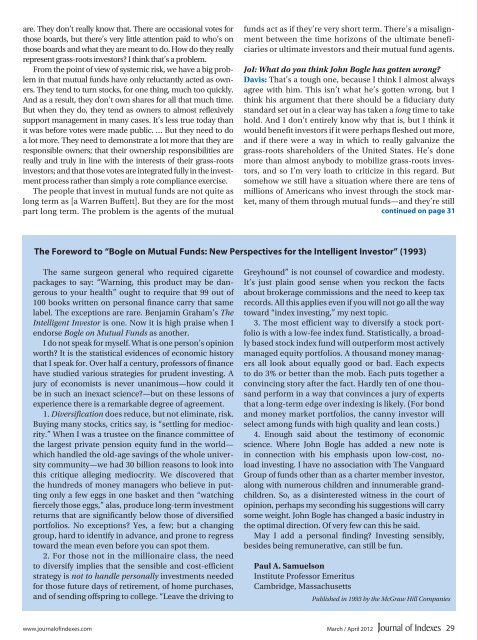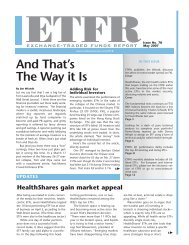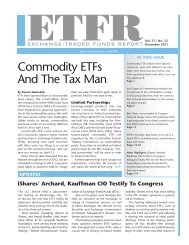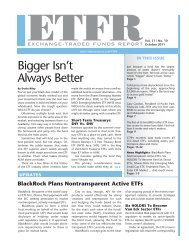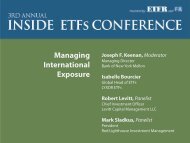Create successful ePaper yourself
Turn your PDF publications into a flip-book with our unique Google optimized e-Paper software.
are. They don’t really know that. There are occasional votes for<br />
those boards, but <strong>the</strong>re’s very little attention paid to who’s on<br />
those boards and what <strong>the</strong>y are meant to do. How do <strong>the</strong>y really<br />
represent grass-roots investors? I think that’s a problem.<br />
From <strong>the</strong> point of view of systemic risk, we have a big problem<br />
in that mutual funds have only reluctantly acted as owners.<br />
They tend to turn stocks, for one thing, much too quickly.<br />
And as a result, <strong>the</strong>y don’t own shares for all that much time.<br />
But when <strong>the</strong>y do, <strong>the</strong>y tend as owners to almost reflexively<br />
support management in many cases. It’s less true today than<br />
it was before votes were made public. ... But <strong>the</strong>y need to do<br />
a lot more. They need to demonstrate a lot more that <strong>the</strong>y are<br />
responsible owners; that <strong>the</strong>ir ownership responsibilities are<br />
really and truly in line with <strong>the</strong> interests of <strong>the</strong>ir grass-roots<br />
investors; and that those votes are integrated fully in <strong>the</strong> investment<br />
process ra<strong>the</strong>r than simply a rote <strong>com</strong>pliance exercise.<br />
The people that invest in mutual funds are not quite as<br />
long term as [a Warren Buffett]. But <strong>the</strong>y are for <strong>the</strong> most<br />
part long term. The problem is <strong>the</strong> agents of <strong>the</strong> mutual<br />
funds act as if <strong>the</strong>y’re very short term. There’s a misalignment<br />
between <strong>the</strong> time horizons of <strong>the</strong> ultimate beneficiaries<br />
or ultimate investors and <strong>the</strong>ir mutual fund agents.<br />
JoI: What do you think John Bogle has gotten wrong?<br />
Davis: That’s a tough one, because I think I almost always<br />
agree with him. This isn’t what he’s gotten wrong, but I<br />
think his argument that <strong>the</strong>re should be a fiduciary duty<br />
standard set out in a clear way has taken a long time to take<br />
hold. And I don’t entirely know why that is, but I think it<br />
would benefit investors if it were perhaps fleshed out more,<br />
and if <strong>the</strong>re were a way in which to really galvanize <strong>the</strong><br />
grass-roots shareholders of <strong>the</strong> United States. He’s done<br />
more than almost anybody to mobilize grass-roots investors,<br />
and so I’m very loath to criticize in this regard. But<br />
somehow we still have a situation where <strong>the</strong>re are tens of<br />
millions of Americans who invest through <strong>the</strong> stock market,<br />
many of <strong>the</strong>m through mutual funds—and <strong>the</strong>y’re still<br />
continued on page 31<br />
The Foreword to “Bogle on Mutual Funds: New Perspectives for <strong>the</strong> Intelligent Investor” (1993)<br />
The same surgeon general who required cigarette<br />
packages to say: “Warning, this product may be dangerous<br />
to your health” ought to require that 99 out of<br />
100 books written on personal finance carry that same<br />
label. The exceptions are rare. Benjamin Graham’s The<br />
Intelligent Investor is one. Now it is high praise when I<br />
endorse Bogle on Mutual Funds as ano<strong>the</strong>r.<br />
I do not speak for myself. What is one person’s opinion<br />
worth? It is <strong>the</strong> statistical evidences of economic history<br />
that I speak for. Over half a century, professors of finance<br />
have studied various strategies for prudent investing. A<br />
jury of economists is never unanimous—how could it<br />
be in such an inexact science?—but on <strong>the</strong>se lessons of<br />
experience <strong>the</strong>re is a remarkable degree of agreement.<br />
1. Diversification does reduce, but not eliminate, risk.<br />
Buying many stocks, critics say, is “settling for mediocrity.”<br />
When I was a trustee on <strong>the</strong> finance <strong>com</strong>mittee of<br />
<strong>the</strong> largest private pension equity fund in <strong>the</strong> world—<br />
which handled <strong>the</strong> old-age savings of <strong>the</strong> whole university<br />
<strong>com</strong>munity—we had 30 billion reasons to look into<br />
this critique alleging mediocrity. We discovered that<br />
<strong>the</strong> hundreds of money managers who believe in putting<br />
only a few eggs in one basket and <strong>the</strong>n “watching<br />
fiercely those eggs,” alas, produce long-term investment<br />
returns that are significantly below those of diversified<br />
portfolios. No exceptions? Yes, a few; but a changing<br />
group, hard to identify in advance, and prone to regress<br />
toward <strong>the</strong> mean even before you can spot <strong>the</strong>m.<br />
2. For those not in <strong>the</strong> millionaire class, <strong>the</strong> need<br />
to diversify implies that <strong>the</strong> sensible and cost-efficient<br />
strategy is not to handle personally investments needed<br />
for those future days of retirement, of home purchases,<br />
and of sending offspring to college. “Leave <strong>the</strong> driving to<br />
Greyhound” is not counsel of cowardice and modesty.<br />
It’s just plain good sense when you reckon <strong>the</strong> facts<br />
about brokerage <strong>com</strong>missions and <strong>the</strong> need to keep tax<br />
records. All this applies even if you will not go all <strong>the</strong> way<br />
toward “index investing,” my next topic.<br />
3. The most efficient way to diversify a stock portfolio<br />
is with a low-fee index fund. Statistically, a broadly<br />
based stock index fund will outperform most actively<br />
managed equity portfolios. A thousand money managers<br />
all look about equally good or bad. Each expects<br />
to do 3% or better than <strong>the</strong> mob. Each puts toge<strong>the</strong>r a<br />
convincing story after <strong>the</strong> fact. Hardly ten of one thousand<br />
perform in a way that convinces a jury of experts<br />
that a long-term edge over indexing is likely. (For bond<br />
and money market portfolios, <strong>the</strong> canny investor will<br />
select among funds with high quality and lean costs.)<br />
4. Enough said about <strong>the</strong> testimony of economic<br />
science. Where John Bogle has added a new note is<br />
in connection with his emphasis upon low-cost, noload<br />
investing. I have no association with The Vanguard<br />
Group of funds o<strong>the</strong>r than as a charter member investor,<br />
along with numerous children and innumerable grandchildren.<br />
So, as a disinterested witness in <strong>the</strong> court of<br />
opinion, perhaps my seconding his suggestions will carry<br />
some weight. John Bogle has changed a basic industry in<br />
<strong>the</strong> optimal direction. Of very few can this be said.<br />
May I add a personal finding? Investing sensibly,<br />
besides being remunerative, can still be fun.<br />
Paul A. Samuelson<br />
Institute Professor Emeritus<br />
Cambridge, Massachusetts<br />
Published in 1993 by <strong>the</strong> McGraw Hill Companies<br />
www.journalofindexes.<strong>com</strong> March / April 2012 29


